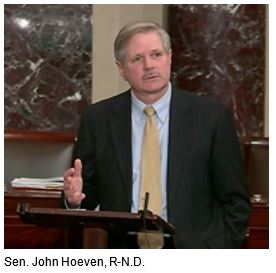WASHINGTON, July 19, 2017 - Senate agricultural appropriators will seek to reinstate the under secretary for rural development position eliminated by USDA Secretary Sonny Perdue.
Following the subcommittee’s approval of a spending bill for fiscal 2018 that largely rejects cuts proposed by the Trump administration, Ag Appropriations subcommittee Chairman John Hoeven, R-N.D., said a bipartisan “manager’s amendment” would be offered to the spending bill when it is considered by the full committee on Thursday.
Hoeven said there is “a strong feeling on the committee that (the under secretary position) provides an emphasis on rural development that we want to see.” In a reorganization announced in May, Perdue said he was creating a new under secretary for trade position as authorized in the 2014 farm bill, but was getting rid of the rural development post. Instead, he named Anne Hazlett assistant to the secretary for rural development. Farm-state senators such as Hoeven and Senate Agriculture Committee ranking member Debbie Stabenow, D-Mich., criticized the realignment.
 Hoeven said the amendment is not a knock on Perdue – “We have great confidence in him” – but that “particularly now when ag’s in a tough spot,” it’s important to show support for the programs and agencies in USDA Rural Development.
Hoeven said the amendment is not a knock on Perdue – “We have great confidence in him” – but that “particularly now when ag’s in a tough spot,” it’s important to show support for the programs and agencies in USDA Rural Development.
In the spending part of the bill, which funds USDA, the Food and Drug Administration, and the Commodity Futures Trading Commission, the subcommittee approved $145.4 billion in discretionary and mandatory funding, $4.85 billion above the administration’s request and $7.9 billion below the FY2017 enacted level.
Total discretionary spending in the bill is $20.525 billion, $352 million below the FY2017 enacted level and $525 million more than the House bill, which cleared the House Appropriations Committee last week.
Unlike the House bill, which severely cuts rural energy programs – slashing the Rural Energy for America Program (REAP) to $1 million – the Senate bill keeps REAP funding and all farm loan programs steady at fiscal 2017 levels.
The Senate bill provides $1.6 billion for Food for Peace grants, “which support the delivery of American-grown food to foreign countries experiencing chronic hunger crises,” the committee said in a news release. (The House bill provides $1.4 billion.) The McGovern-Dole International Food for Education and Child Nutrition Program would receive $206.62 million, about $21.5 million more than the House bill.
Like the House bill, the Senate version rejects the Trump administration’s request to close 17 agricultural research facilities.
The bill funds other areas as follows:
--Agricultural Research – $2.55 billion for research conducted by the Agricultural Research Service and the National Institute of Food and Agriculture, including $375 million for the Agriculture and Food Research Initiative, which maintains the increase provided in FY2017. Formula research funding for land-grant universities is maintained at FY2017 enacted levels.
--Animal and Plant Health Inspection Service (APHIS) – $953.2 million for APHIS, $143.2 million above the budget request and $7 million above the FY2017 enacted level.
--Natural Resources Conservation Service – $874.1 million, $9.6 million above the FY2017 enacted level and $108.1 million over the budget request. The bill includes $150 million for the Watershed and Flood Prevention Operations program to support investments in rural communities.
--Farm Service Agency (FSA) – $1.521 billion for FSA for various farm, conservation, and emergency loan programs. It prohibits the closure of FSA county offices, and provides resources for personnel and physical security programs across county offices.
--Food Safety and Inspection Service (FSIS) – $1.038 billion, $6 million above the FY2017 enacted level. The bill provides full funding for FSIS to implement siluriformes (including catfish) fish and fish product inspection.
--Food and Drug Administration (FDA) – $2.8 billion in discretionary funding for the FDA, $1 million over the FY2017 enacted level. Overall, total FDA funding, including user fee revenues, is $5.2 billion, which is $491 million above FY2017. The bill does not support new user fees or the associated cuts to budget authority as proposed in the budget request. Food safety activities are fully supported, and the bill provides $60 million as authorized in the 21st Century Cures Act.
#30


